Affiliate Marketing in 2024: Survey of 2,270 Affiliate Marketers Reveals What’s Working
UPDATED October 3, 2024
6 MIN READVikash Prajapati
Everyone has an opinion on what’s working in affiliate marketing, but no one seems to have the data to back it up.
To cut through the BS and discover what successful affiliate marketers are doing right now, we surveyed 2,270 professional affiliate marketers.
Specifically, we wanted to discover what strategies are working for them, what separates the 6+ figure earners from the rest of the field, and what it really takes to build a successful affiliate marketing business in 2024.
We’ve been teaching affiliate marketing for over 10 years, and even we were shocked by some of our findings. Rewind 10sPlayForward 10s
Key Takeaways From The Survey
Here’s a summary of the most interesting findings and key affiliate marketing statistics:
We asked everyone how much they make, and found that the average affiliate marketer earns $8,038 per month.
We also cross-referenced traffic with earnings and found the average affiliate website RPM is $149.76.
Affiliate marketers with 3+ years of experience earn 9.45x more than beginners. If you’re just starting out, stick with it!
Out of 19 broad niche categories, we found that the 3 most profitable niches are Education/E-Learning, Travel, and Beauty/Skincare.
If you’re having traffic problems, you’re not alone. 45.3% of affiliate marketers say getting traffic is their biggest challenge.
82% of websites earning 6+ figures annually monetize with display ads and affiliate products. If you’re not using both, you’re probably losing money.
Affiliate marketers earning $10k+ per month are 1.5x more likely to socialize with other affiliate marketers. If you haven’t started networking, now’s the time.
Only 25.1% of affiliate marketers have been negatively impacted by recent search algorithm updates. Given the recent doom and gloom, we’re surprised the number is this low.
31.3% of affiliate marketers earning 6+ figures annually considered giving up at some point. If you’re feeling some doubt, keep going. Success may be just around the corner.
About This Survey
We surveyed 2,270 affiliate marketers with a wide range of experience levels, monthly earnings, and team sizes.
This allowed us to cross-reference experience, earnings, and team size data with questions about traffic sources, monetization methods, and general affiliate marketing strategy.
To reach a large audience, we sent the survey to our email list with over 100,000 subscribers, promoted it on our Podcast, mentioned it on Twitter, and shared it in our Facebook and Discord communities. We also ran some Twitter and Facebook ads to increase responses.
The average respondent had 2.8 years of experience, but participants ranged from less than 1 year to over 10 years.
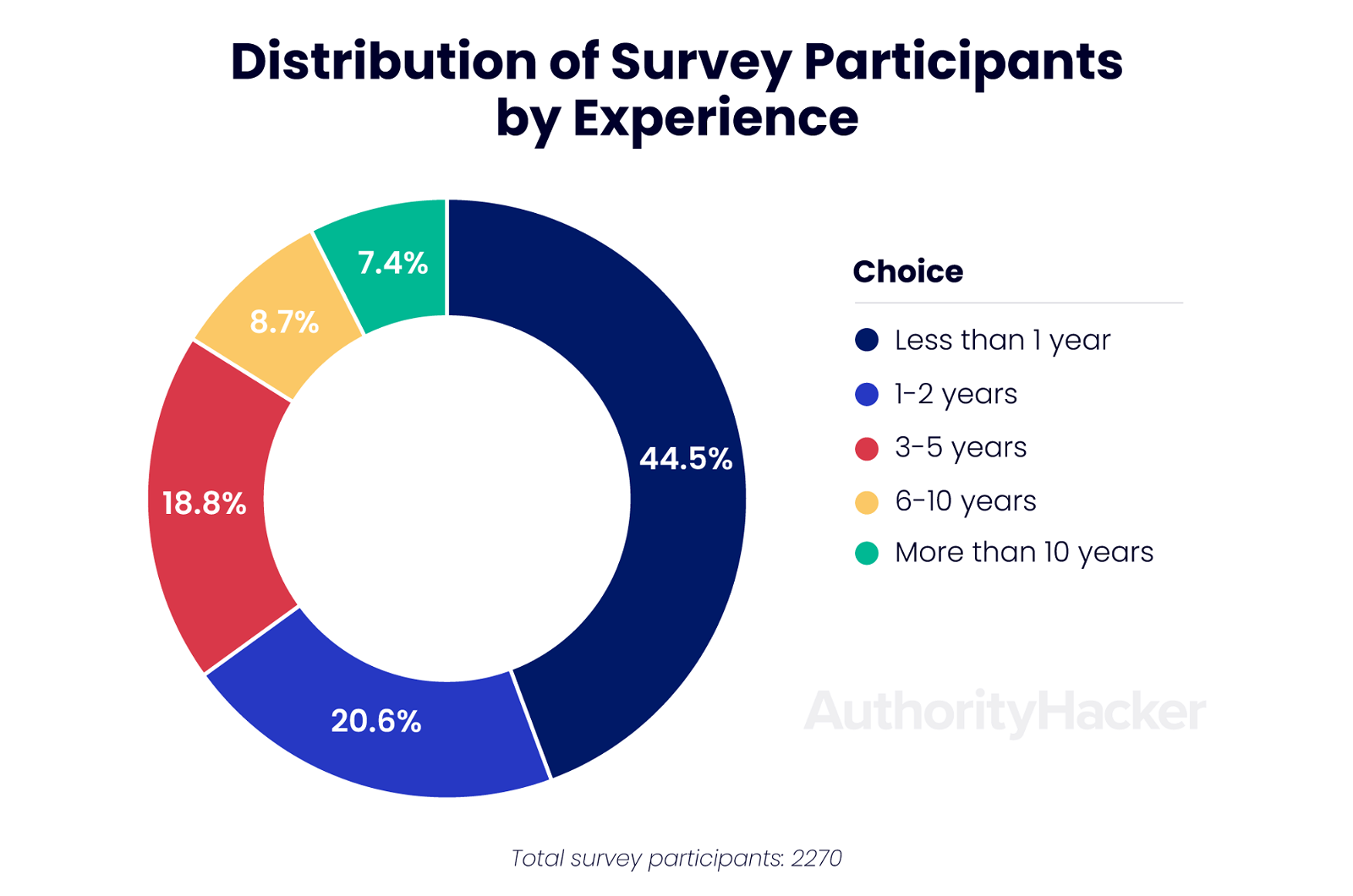
Throughout the survey, we consistently found that affiliate marketers with more experience and earnings used different tactics than beginners. We’ll discuss all of these differences at length.
The Authority Hacker audience predominantly includes website owners, so the findings reflect affiliate marketing strategies related to websites more than other methods.
The respondents also represent a diverse range of affiliate marketing niches, giving us broad insights into what’s working across many verticals.
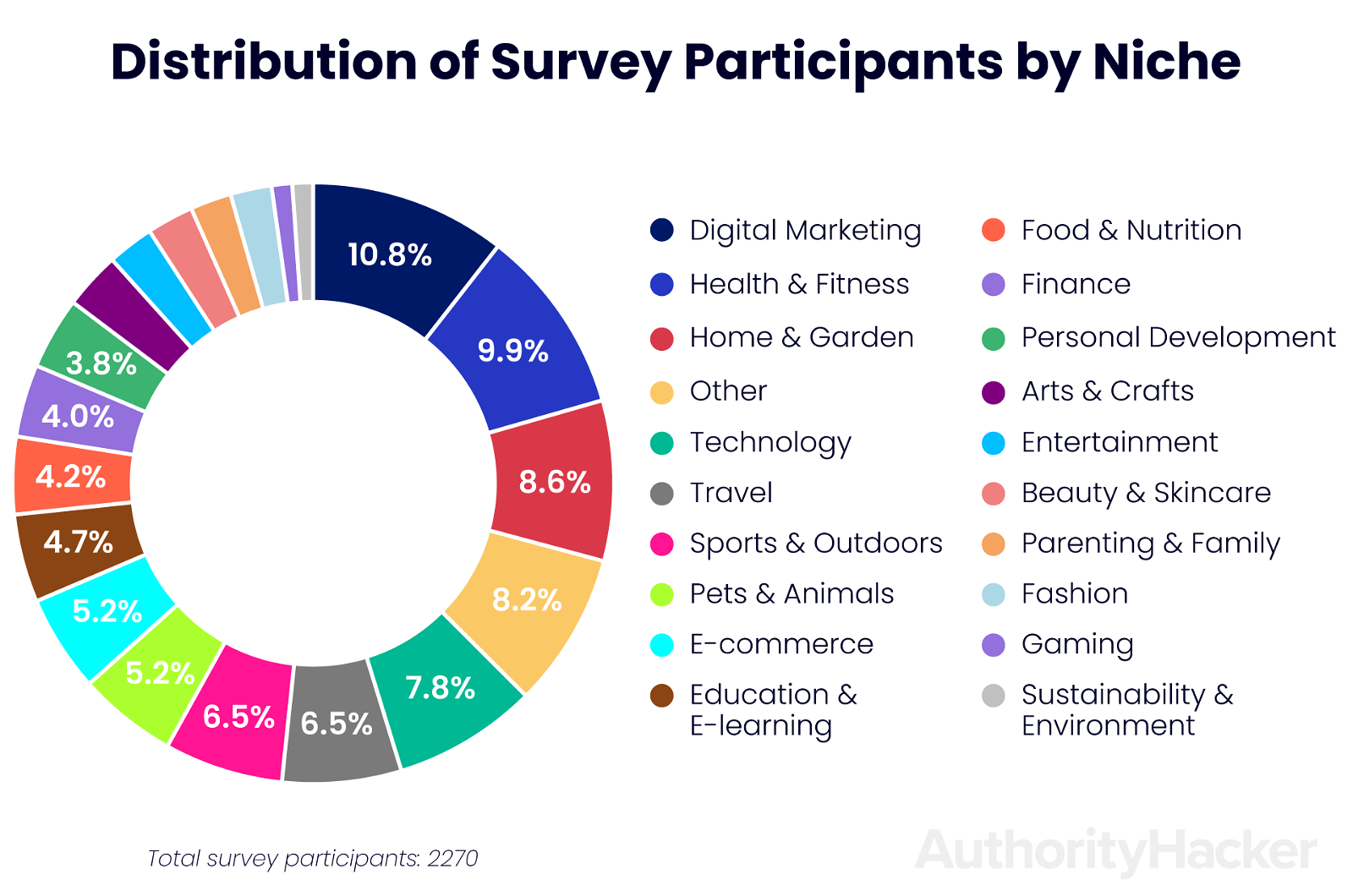
With no niche making up more than 10.8% of respondents, we have a nicely distributed snapshot across many verticals. This variety strengthens the data by reducing potential niche-specific biases.
The Average Affiliate Marketer Earns $8,038 Per Month
Across all experience levels, the average affiliate marketer earns just over $8,000.
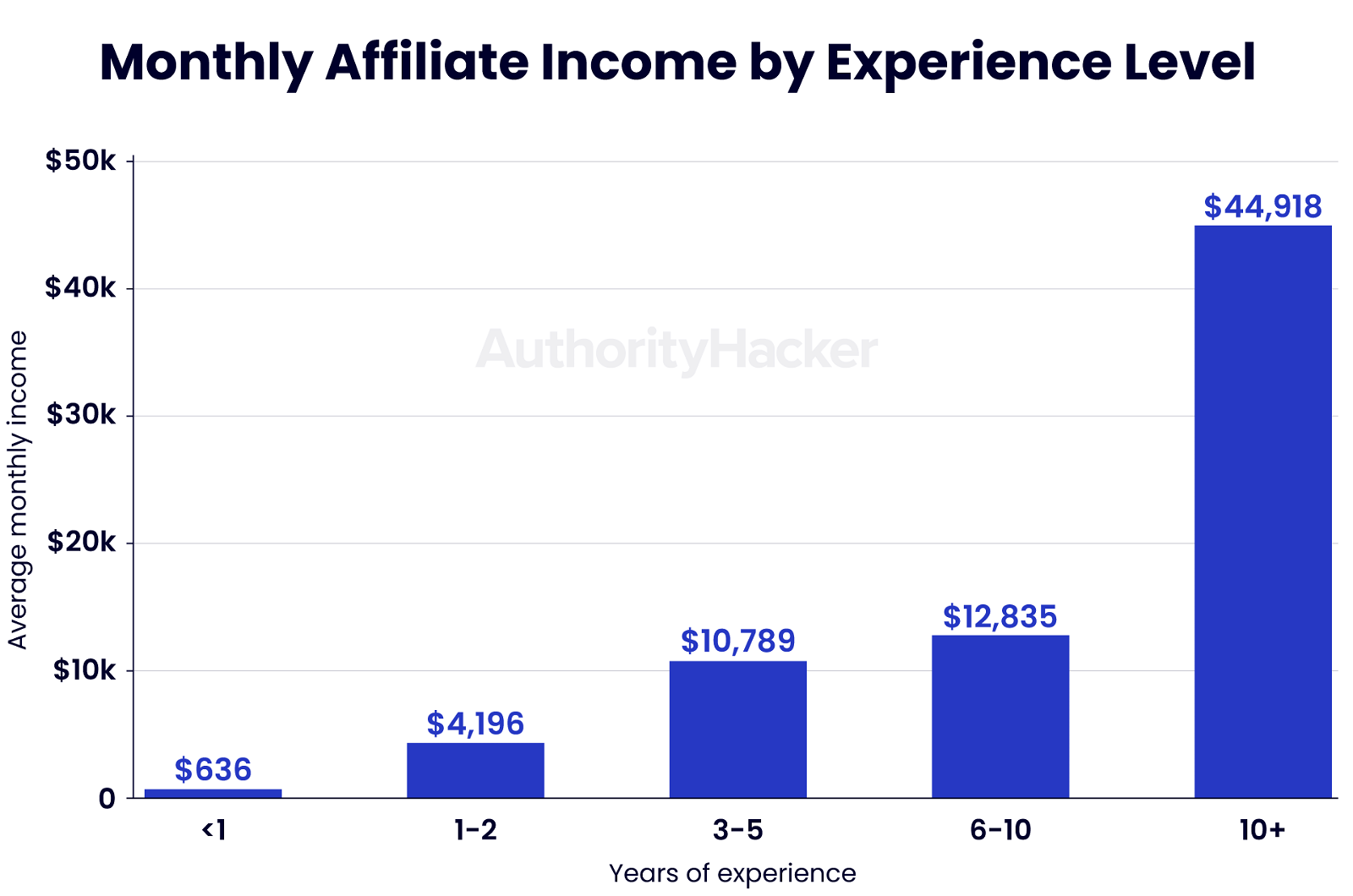
That’s over $96,000 per year – a terrific salary for a location-independent position that lets you set your own hours and make your own decisions.
If you’re a beginner with people questioning your decision to start affiliate marketing, share this stat with them and explain just how much potential there is to earn a real living.
There’s also a clear correlation between more experience and earning more money – no surprise there.
What caught my attention is the enormous gap in earnings between beginners and those with 3+ years in the industry.
- Affiliate marketers with 3+ years of experience earn 9.45x more than beginners.
- Even if you remove the most experienced respondents, those with 3-5 years of experience earn 4.46x more than newcomers.
- Marketers who have been in the game for 10+ years make approximately 6.31x more than everyone else.
The takeaway?
There’s a two-year “beginner’s hump” that newcomers to affiliate marketing must overcome. If you get over that hump, your earning potential shoots off the charts.
Affiliate Marketers Earning 6 Figures Annually Have 6+ Team Members
We know how challenging building a team is, but you shouldn’t let the difficulties stop you. The data shows it’s a crucial part of growing your revenue.
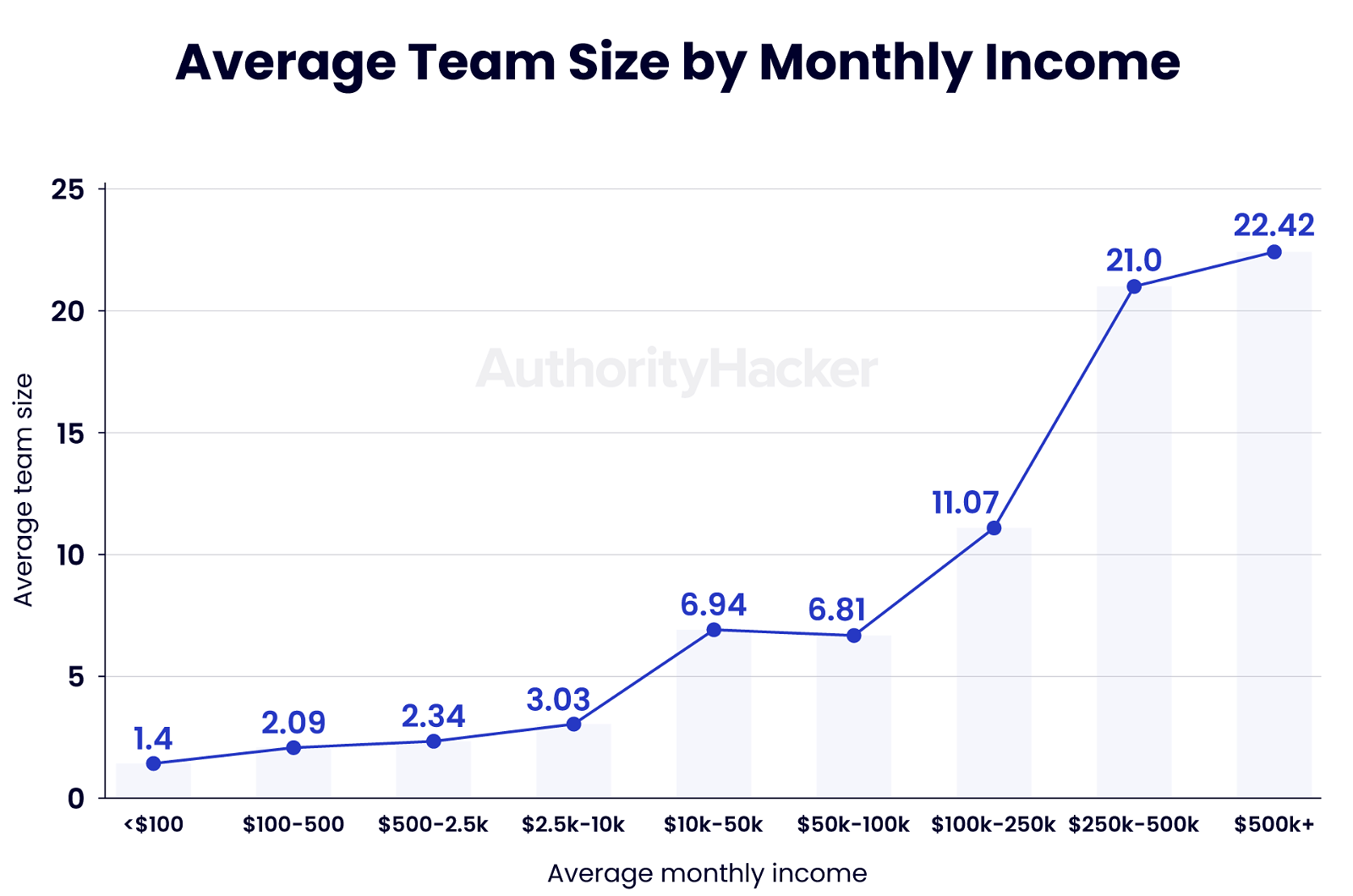
My recommendation? Use the above graph as a general guide to check if you have an appropriate number of team members.
If you’re making $5,000 per month but are still a solopreneur – or earning $25,000 per month with 3 team members – there may be opportunities to grow your business by making new hires.
Of course, there’s a lot of nuance, such as what positions you should hire for or how much you should pay.
This survey doesn’t go into those details, but the data suggests that if you’re finding success, you should hire people to handle less important tasks so you can focus on what truly moves the needle in your business.
The 3 Most Profitable Affiliate Niches Are Education/E-Learning, Travel, and Beauty/Skincare
Of the 19 broad niches we asked about, these 3 were the most profitable.
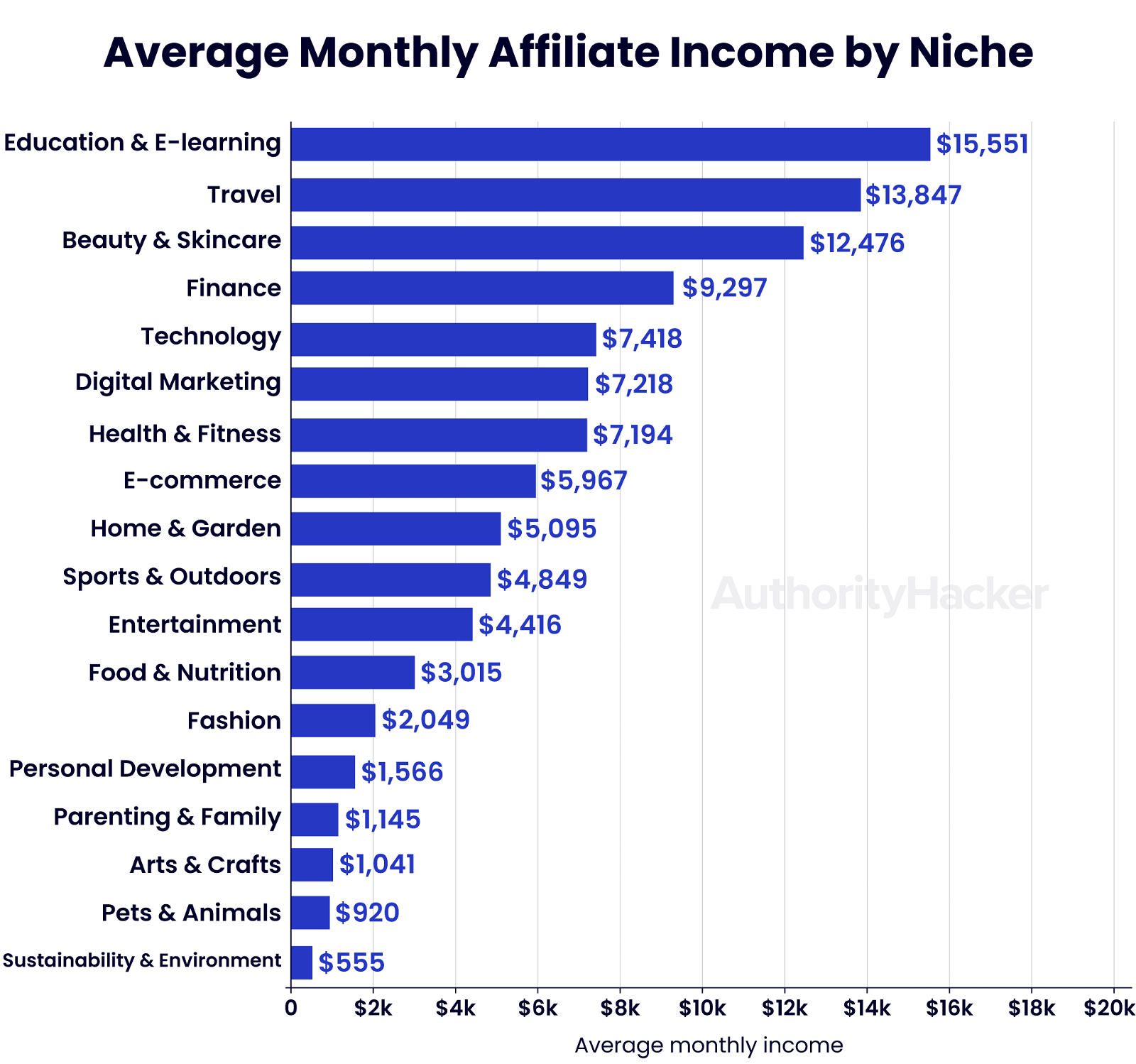
There’s also a clear gap in earnings between the top 7 niches – which earn over $7,000 on average – and the rest, which earn ~$500 to ~$6,000. The highest-earning niches are generally more competitive, so beginners may be avoiding them.
However, most niches still leave plenty of room for substantial income. Of the 19 niches included in the survey, 11 earned an average of over $4,000 per month, which generally equates to “job replacement income.”
When we compare monthly earnings to RPMs, the gap between the highest and lowest niches gets noticeably smaller. However, the order shows little change for most niches.